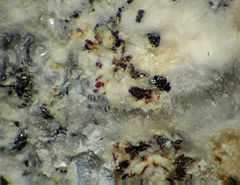Brownmillerite
| Brownmillerite | |
|---|---|
 Red/red-brown crystals of brownmillerite from Caspar quarry, Bellerberg volcano, Ettringen, Mayen, Eifel Mts, Rhineland-Palatinate, Germany | |
| General | |
| Category | Oxide mineral |
| Formula (repeating unit) | Ca2(Al,Fe)2O5 |
| Strunz classification | 04.AC.10 |
| Dana classification | 7.11.2.1 |
| Crystal symmetry |
Orthorhombic dipyramidal H-M symbol: (2/m 2/m 2/m) Space group: Ibmm |
| Unit cell | a = 5.57 Å, b = 14.52 Å, c = 5.34 Å; Z=2 |
| Identification | |
| Color | Reddish brown |
| Crystal habit | As minute square platelets; massive |
| Crystal system | Orthorhombic |
| Diaphaneity | Semitransparent |
| Specific gravity | 3.76 |
| Optical properties | Biaxial (-) |
| Refractive index | nα = 1.960 nβ = 2.010 nγ = 2.040 |
| Birefringence | δ = 0.080 |
| Pleochroism | Distinct; X = Y = yellow-brown; Z = dark brown |
| 2V angle | 75° (measured) |
| References | [1][2][3] |
Brownmillerite is a rare oxide mineral with chemical formula is Ca2(Al,Fe)2O5. It is named for Lorrin Thomas Brownmiller (1902–1990), chief chemist of the Alpha Portland Cement Company, Easton, Pennsylvania.
Discovery and occurrence
The chemical compound was first recognized in 1932 and named for the chemist who identified it. The naturally occurring mineral form of the compound was first recognized in 1964 for occurrences in the Bellerberg volcano, Ettringen, Mayen-Koblenz, Germany.[2]
At the type locality the mineral occurs within limestone blocks that are contained in a volcanic flow. The limestone blocks had undergone thermal metamorphism. The mineral also occurs in the thermally altered strata of the Hatrurim Formation of Israel. Minerals associated with brownmillerite in the Mayen locality include calcite, ettringite, wollastonite, larnite, mayenite, gehlenite, diopside, pyrrhotite, grossular, spinel, afwillite, jennite, portlandite and jasmundite. In an Austrian occurrence near Kloch, melilite, mayenite, wollastonite, kalsilite and corundum are found. Within the Hatrurim area spurrite, larnite and mayenite are associated.[1]